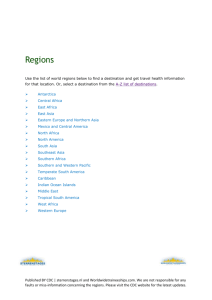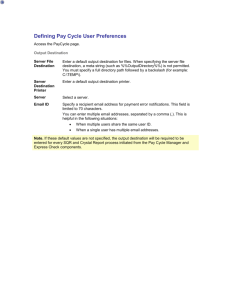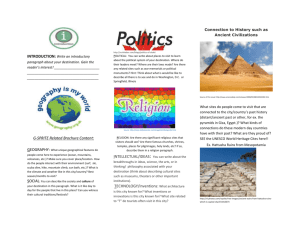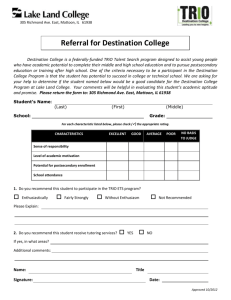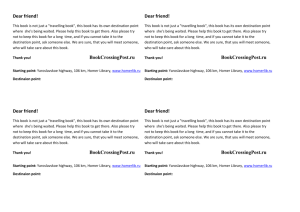Pre-Departure Presentation - Melbourne Global Mobility
advertisement
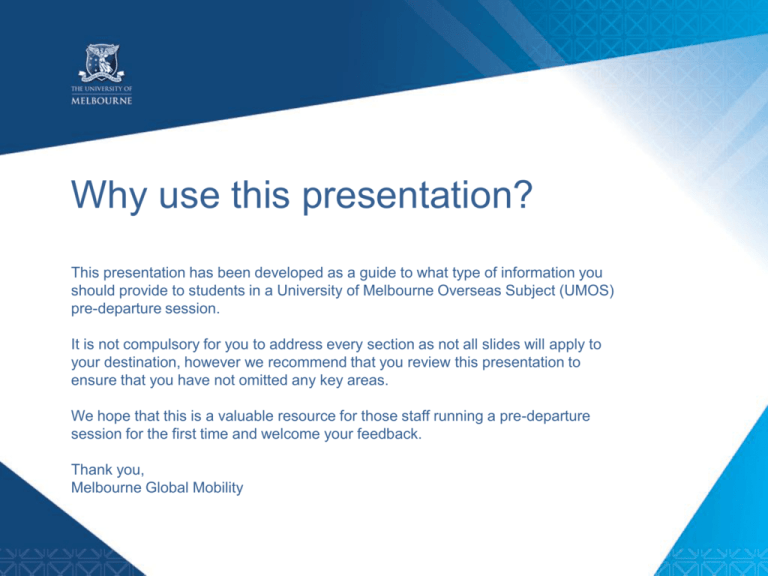
Why use this presentation? This presentation has been developed as a guide to what type of information you should provide to students in a University of Melbourne Overseas Subject (UMOS) pre-departure session. It is not compulsory for you to address every section as not all slides will apply to your destination, however we recommend that you review this presentation to ensure that you have not omitted any key areas. We hope that this is a valuable resource for those staff running a pre-departure session for the first time and welcome your feedback. Thank you, Melbourne Global Mobility Subject Name Pre-departure DESCRIPTION OF PRESENTATION Students’ Expectations Before starting your presentation try to get students thinking about their expectations. You may want to ask them to write this down or discuss it in groups. Some ideas are: • Why did they enrol in this subject? • What are the academic, social and travel goals that they hope to get out of the program? • How will this subject be different to being on an overseas holiday? • What are they most looking forward to? What are they most worried about? • What will they miss most about home while they’re away? Your Expectations After discussing students’ expectations, you need to be very clear about your expectations. Think about: • Time commitment. Will there be long days? Will there be free time? What are the repercussions of students running late all of the time? • Participation. Remind students that they must be mentally present and engaged in group activities. • Group dynamics. How do you expect them to behave/work together? How do you expect them to behave towards you? Get them to think about their own annoying traits and remind them that they will all be living very closely for 2-3 weeks and they should be mindful of others. • Unforgivable offences. Be clear right from the start about will not be tolerated. Will there be a warning system? Will students be sent home? Destination Information This section should cover details such as: • Location & Route • Accommodation • Climate • Language • Cultural Differences & Local Laws • Money • Travel Documents • Health Location & Route Hopefully students will have read up on this! To make sure they are all on the same page you should cover: • Arrival. Where is the accommodation? How do students get their from the airport? Prep students on what to say at immigration; they are not ‘there to study’, this could be misinterpreted by immigration officials who may think they will be enrolling at a local institution. • Route. Where will you be travelling and on which days? Will this be by bus, train, plane? What will the roads be like? • Destination. Are some of the sites at high altitude? Is the air quality poor? • Images. Show maps and photos to help students start visualizing the locations. Accommodation Bad accommodation can ruin the whole experience, so make sure students understand their accommodation before they arrive. • Sleeping. What type of place is it? Is it motels, hotels, guesthouses, cabins, camping? Will students be sharing? Do they get to choose their roommate or will they be paired up randomnly? Do they have their own bathroom or is it shared? •Temperature. Is there heating/air conditioning? • Eating. Is breakfast included? Will the hotel accommodate dietary requirements? You don’t have to know the answer to this, but it will help those with allergies start thinking about how they will organise their breakfast when they arrive. • Drinking. Can students drink the tap water? If not, does they hotel provide free drinking water or will they need to buy it? • Stars. Try not to describe accommodation in terms of how many stars it has. Businesses can tick all the boxes for 5 stars and still be an inn or motel. Climate Understanding the climate will help students pack appropriately. • Season. What time of year are you going? What does this mean? Is summer in your destination 26°C or will it be 46° and humid? • Impact. How much will you be impacted by the outside conditions? Will you be spending a lot of time outside in the elements or will you be visiting a number of museums, lectures, working inside in an office environment? • Bites. Will there be a lot of mosquitos, sand flies, etc. at this time of year? Will students need to pack suitable clothing to protect them? Language If this is a language class then this section is obvious, but if not, students should be advised what to expect. • Language. What is the destination language? Do you speak it? Is there anyone in the group that speaks this language? Will you be accompanied by a local guide/assistant that can help with translation? • Alphabet. Is it the Roman alphabet? Will students be able to read and recognise signs in public places? • Classes. Will students be given some intensive classes when they arrive to help them with basic communications? If not, can you provide them with a list of basic phrases they may need? • English. What is the likelihood that English will be understood and spoken? Is this more likely in cities as opposed to smaller towns? Cultural Differences& Local Laws Learning to navigate and understand a new culture will be part of the subject, but what do students need to know before they arrive? • Dress. What is appropriate dress for men and women at your destination? Does this apply all of the time or only when visiting religious sites? • Laws. Are there any strict laws that students may not be familiar with? What is the country’s stance on alcohol and drugs? Is touching, hugging or kissing in public allowed? What is the attitude towards LGBT individuals? • Unspoken rules. What is considered polite and offensive in the local culture? Those examples mentioned above may not be outlawed, but are they acceptable? • Photographs. Remind students to always ask for permission before taking photographs. • Scams. Are there any known local scams that students need to be aware of? How should students react to beggars? • Bargaining. Is it acceptable to bargain when shopping? How is this done? How should students handle being bombarded at markets and in the street by people wanting them to purchase goods? Money In addition to reiterating the budget for additional expenses, this section should cover: • Exchange rate. What is it at the moment? In which direction has it been moving recently? • Access. Will ATMs be widely available at your destination? Will students need to carry cash and exchange along the way? Do vendors accept multiple currencies? • Tipping. What is expected in your destination country? For group tours should students tip individually or will it be done as a group? If tipping as a group, will someone be in charge of a kitty? Travel Documents Hopefully students have sorted out their travel documents by now, but it’s always good to remind them what is required. • Passports. Students and staff must have a passport valid for at least 6 months after they return. Many countries will not allow entry if passports are close to expiring. • Visas. Does your destination country require students to have a visa? What about students who are not Australian citizens? Can it be purchased on arrival or must it be organised prior to departure? How much is it? • Copies. Students should make sure that they carry a photocopy of their passport and any visas in a safe place. They should also leave a copy behind with their family or significant other and they may want to save electronic copies to their devices or in a Dropbox/Google docs type of system. • Bank statements. It is a good idea to carry a printout of a recent bank statement or credit card with available funds in case students are requested by immigration officials to show access to adequate funds. Health Picking up a virus or eating a dodgy dinner aren’t the only health concerns when travelling overseas. • Vaccinations. Students and staff should carefully research what vaccinations are required for their destination and if they need to provide proof of immunization when returning to Australia, ie. yellow fever certificate. • Medications. Where required students and staff should take an adequate supply of personal medications and a letter from their doctor explaining the condition for which the medications are prescribed. • First Aid Kits. You should carry a first aid kit with you, but students should also take their own supplies to treat blisters, dry eyes, bites and stings, diarrhea and other minor ailments. • Jetlag. There may be students who haven’t travelled before, remind them to keep hydrated, get enough sleep and to not drink too much alcohol on the plane. • Weather. If you are travelling in extreme heat or cold, make sure students know how to look after themselves in these conditions and that they know the symptoms of heatstroke and hypothermia. • Sex. Remind students to be safe and to take condoms with them. If travelling to a country where sexual relations between unmarried men and women is illegal make sure they are informed. Safety & Emergency Situations You can never be 100% ready for something to go wrong, however taking precautions where possible and making sure students are aware of your emergency plan can minimise the impact. • Street crime. What are the common street crimes at your destination? Is it pickpocketing, bag slashing, being conned in taxis? Knowing this information will help students take precautions and mentally prepare for the possibility of this happening to them. • Natural disasters. Some cities, although still safe to visit ,may be prone to earthquakes, hurricanes or situated close to active volcanoes. Make sure students know that it is unlikely that there will be an incident whilst they are there and advise them that you will identify an evacuation meeting point or provide them with a copy of your emergency plan upon arrival. • Civil unrest. This may or may not be relevant to your destination, but if it is, make sure students know to avoid protests and public demonstrations. • Emergency plan. Although we don’t like to think about it, there is just as much chance that something could happen to you as there is to a student. Make sure students have access to an emergency plan and phone numbers in the event that they need to act quickly or on your behalf. Returning Home This section should cover details such as: • Evaluation • Assistance with future promotion • Editorial and photo permission Subject Evaluation Seeking student feedback is the key to improving your subject each year. • Subject Experience Survey (SES). In addition to the SES it’s is important to evaluate the practical components of your subject that are not considered in this survey. • What should I ask? Students should be given the opportunity to provide feedback on accommodations, transport, site visits, the program itinerary – for eg. did they feel that they had sufficient time at each destination? Sufficient down time to process each day and prepare for the next? • Seek recommendations. Students should also have the chance to suggest activities that they would have liked to do, or types of assessment that would have been engaging. Future Promotion & Permission Past students are your greatest resource and your best marketing tool. • Photos, videos and testimonials. It’s a good idea to ask students to sign an image and editorial consent form on either the first or last day of the program. This gives you permission to use photos taken by you on the website or in future promotional material. You may also ask students to provide some of their own photos and/or a testimonial, the consent forms will allow you to use this material as well. Consent forms can be obtained from the University’s marketing website: http://marketing.unimelb.edu.au/ • Information sessions. Students want to ask questions of other students so it’s great if you can invite past students along to information sessions that you run. They may prepare a minipresentation of their own or just be there to answer questions as they come up.
